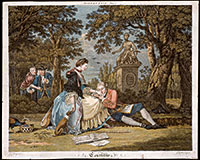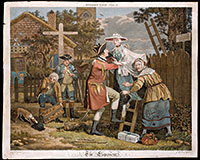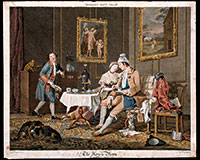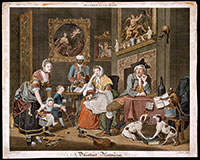Page content
More Power to You
Abigail Adams advocated dismantling
the 'masculine system' that denied property
and legal rights to married women
by Lindsay Keiter

Artist John Collett depicts a satirical view of the evolution of 18th-century marriage in a series called Modern Love. The first print, Courtship, depicts a couple clearly carried away by affection.

The second of the Modern Love series, called The Elopement, portrays unbridled romantic love as a threat to the thoughtful and practical selection of a spouse.

The Honeymoon offers a scene of emotional compatibility. In a time of coverture, a married woman gave up her rights to own property, make purchases or enter into contracts.

Discordant Matrimony illustrates the ultimate letdown - two incompatible people yoked together- for life.
As political revolution swept through the 18th-century British Colonies, Abigail Adams suggested to her husband, John, that there might also be a rebellion in the principles and laws of household government. If tyranny was unacceptable in government, it should be intolerable in marriage.
Abigail Adams was among those who wanted a new interpretation of what marriage meant in Anglo-American common law. She did not want to abolish marriage or even to make men and women legal equals. Instead, she proposed that the new American government pass laws to limit the almost-total power husbands held over their wives.
"If particular care and attention is not paid to the ladies, we are determined to foment a rebellion, and will not hold ourselves bound by any laws in which we have no voice or representation," Abigail Adams warned her husband in a letter dated May 31, 1776.
On both sides of the Atlantic, middling and well-to-do men and women embraced what historians call "companionate marriage" — unions based on mutual esteem and affection, where husbands exercised authority benevolently and treated wives as emotional equals.
A spouse, ideally, should meet more than just material needs and bring more than property or skills to a match — he or she should offer enduring emotional satisfaction. Love was still suspect — such a fickle passion was not a suitable basis for such a monumental decision. In contrast, mutual regard, refined companionship and emotional compatibility were reasonable and rewarding objectives.
Abigail Adams entreated John Adams to "Remember all Men would be tyrants if they could." The opportunity for the tyranny to which she referred was coverture — the heavy legal limits imposed on women by English common law, adopted throughout the Colonies.
Coverture held that when a woman married, she could not own property or make purchases in her own name (unless special arrangements were made), enter into contracts or act in court. She had no automatic claims to property or to her children if her marriage was unhappy. Husbands were the public representatives and absolute rulers of their households.
By all accounts, Abigail and John enjoyed a rewarding marriage of intellectual equals. In her book Dearest Friends, author Lynne Withey describes John and Abigail as a couple who married for love and maintained a close relationship until the end of their lives. He admired her intelligence. She supported his political career and acted as an informal adviser. The letters they exchanged — which numbered more than 1,000 — demonstrated a friendship and devotion to each other that sometimes seems more representative of modern marriage.
The letters also contained strong opinions. In one letter, Abigail contended that in general "your Sex are Naturally Tyrannical is a Truth so thoroughly established as to admit of no dispute." John himself was an example of a man who "willingly (gave) up the harsh title of Master for the more tender and endearing one of Friend." Abigail knew not all women were so fortunate. She continued, "Why then, not put it out of the power of the vicious and the Lawless to use us with cruelty and indignity with impunity."
"As to your extraordinary Code of Laws, I cannot but laugh," John Adams responded. "Depend upon it, We know better than to repeal our Masculine systems."
The "masculine system" to which John Adams referred was predicated on the unequal exchange of rights involved in marriage. He sought to minimize this inequality by claiming that "Altho they are in full Force, you know they are little more than Theory. We dare not exert our Power in its full Latitude."
Men less enlightened than John Adams certainly wielded their authority "in its full latitude," of course, and many other husbands made their families miserable through failure or neglect rather than violence — as Abigail knew firsthand. Her brother, William, struggled with alcohol and debt before eventually abandoning his wife and children. Abandoned women were left in a dire position — they had no financial standing of their own and no legal authority, unless they could prove their husband was dead or until he had been gone for seven years.
These wives would have to secure the aid of friends and marshal community support to negotiate their limitations. Sarah Perry Hallam found herself in Williamsburg in such a situation after parting ways with her actor husband in the early 1770s. She secured a powerful benefactor to act as her financial security and negotiated around her coverture to run a business as a dance mistress.
Fortunately, Lewis Hallam did not exercise his legal claims to his wife's earnings or property, permitting her to build a secure foundation for herself and her sons. Powerful Colonial families weren't immune to such problems. The sad fates of Thomas Jefferson's daughter and granddaughter make plain that the third President's family was also limited by the legal and social structures of early Republican Virginia.
Jefferson had made no prenuptial settlements for his daughters or granddaughters, despite his familiarity with Virginia law and his own chronic indebtedness. He may have felt he did due diligence in seeing his daughter Martha and his granddaughter Ann married to the sons of friends from prominent families, although both women married fairly young at 17.
When their husbands proved improvident and volatile, Jefferson was largely passive, failing to leverage his legal knowledge and social clout to assist them.
Jefferson embraced the familial implication of Enlightenment philosophy, writing a friend in France that he, "according to the usage of my country, scrupulously suppressed my wishes, that my daughter might indulge her own sentiments freely" in selecting a husband. Martha chose Thomas Mann Randolph, the son of a wealthy planter. Precautions to protect Martha may have seemed unnecessary, but the newlyweds' financial foundations were built on shifting sands. Shortly after they wed, Randolph's father remarried and the child of that union inherited the family plantation, Tuckahoe.
Mounting expenses from Randolph's business and political career compounded this initial setback. Like his father-in-law, Randolph was plagued by debt, both inherited from his father and accumulated during his term as governor of Virginia. His difficulties in making a profit from planting were further strained by the regular arrival of new children, eventually totaling 11. Cynthia Kierner, in her biography of Martha Jefferson Randolph, suspects that Thomas Mann Randolph began drinking due to his anger and anxiety over his dim prospects and loss of status.
His failure to adequately provide for his family strained his relationships with his wife, his father-in-law and his children. Alcohol made his temper more ungovernable and eventually prompted Martha to permanently retreat to Monticello with her younger children. Martha struggled to educate her children and support herself after both men died. She depended upon her adult children to house her after her father died and Monticello was sold.
The daughter of the Nation's third President died in genteel poverty in 1836.
Jefferson, Martha and Thomas Mann Randolph also bore witness to the terrible fate of a woman with a "vicious" husband — the kind of man Abigail Adams implored John to restrain through law.
At 17, Ann Cary Randolph married 20-year-old Charles Bankhead, the son of a family friend. Bankhead's failings far exceeded those of Thomas Mann Randolph. Ann's marriage was continually marred by her husband's drunkenness and violence. Though her parents had created a trust for her upon her marriage, consisting of one-third of a 1,450-acre tract, it was subject to her husband's ineffective management. Like her father, Ann's husband was unsuccessful as a planter and turned to drink. Unlike Randolph, Charles Bankhead was openly violent toward his wife. In 1815, Jefferson recorded that Charles "had committed an assault of the greatest violence," forcing Ann to "take refuge in her mother's room." Even after Charles publicly stabbed his brother-in-law, Ann continued to live with him, bearing and raising children. She died at Monticello in 1826, shortly before her grandfather, from complications due to childbirth.
While he loved his daughter and granddaughter, Jefferson ultimately supported a model of marriage that was fundamentally unequal. Like John Adams, he recognized that the power men gained in marriage was so ingrained in American law and culture that to place limits on it would generate enormous legal, economic and political uncertainty.
Coverture cast its shadow well into the 20th century. Women only gradually gained limited property rights over the course of the 19th century, mainly through laws called the Married Women's Property Acts or Married Women's Earning Acts, which were adopted in individual states beginning in 1839. It was not until 1974 that the Equal Credit Opportunity Act guaranteed married women the right to open accounts without their husband's permission. The wage gap formerly justified by women's dependence on a husband's income has narrowed, but women continue to suffer greater loss of income and greater risk of poverty after a divorce than men do.
Abigail Adams might have predicted the slow, uneven nature of the progress of women's rights in marriage. "I cannot say that I think you very generous to the Ladies, for whilst you are proclaiming peace and good will to Men, emancipating all Nations, you insist upon retaining an absolute power over Wives," she wrote to John in a letter dated May 7, 1776.
